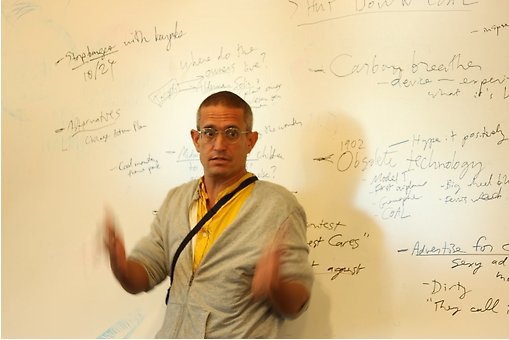How To Do Things With Words
dal 31/10/2010 al 8/11/2010
Segnalato da
Melanie Crean
Azin Feizabadi
Kaya Behkalam
Andrea Geyer
Sharon Hayes
Yael Kanarek
Carlos Motta
Martha Rosler
the Iraqi/U.S. Cross Wire Collective
Mark Tribe
The Yes Men
Wafaa Bilal
Feizabadi
Kanarek
Huong Ngo
Hong-An Truong
Tribe
Mary Walling Blackburn
31/10/2010
How To Do Things With Words
Arnold and Sheila Aronson Galleries C. Johnson Design Center, New York
An exhibition of radical speech acts. This exhibition presents work by 15 artists (individuals and collectives) exploring the relationship between language and power, media, action, and socio-political context in innovative ways. It includes gallery works, talks, workshops, and performances. The gallery itself is set up as a space for speech and action, designed by Jordan Parnass as an interpretation of the UN Security Council chamber constructed with laser-cut plywood furniture.

This exhibition presents work by 15 artists (individuals and collectives) exploring the relationship between language and power, media, action, and socio-political context in innovative ways. It includes gallery works, talks, workshops, and performances. The gallery itself is set up as a space for speech and action, designed by Jordan Parnass as an interpretation of the UN Security Council chamber constructed with laser-cut plywood furniture.
Participating artists: Melanie Crean; Azin Feizabadi and Kaya Behkalam; Andrea Geyer and Sharon Hayes; Yael Kanarek; Carlos Motta; Martha Rosler; the Iraqi/U.S. Cross Wire Collective; Mark Tribe; and the Yes Men.
Artists presenting talks and performances include Wafaa Bilal, Azin Feizabadi, Yael Kanarek, Huong Ngo and Hong-An Truong, Mark Tribe, and Mary Walling Blackburn.
Several pieces in the show relate speech to the urgency of the political process during an election season. Carlos Motta's Six Acts: An Experiment in Narrative Justice (2010) reenacts a series of speeches concerning the concept of peace, which were originally delivered by six liberal Colombian presidential candidates from the 20th century who were assassinated because of their ideology. Performed by actors in public squares in Bogota during the last presidential campaign, the work emphasizes the transformative potential of fiction as a tool of reparative collective memory. Azin Feizabadi’s The Epic of the Lovers: God, Mafia and the Citizens (2009) muses on the disparity between individual and collective desire for change during Iran’s Green movement. It was written and photographed by the artist as he participated in the protests in Tehran. Melanie Crean’s The Anonymous Archives (2008-2010) is an online archive of interviews that document the rapid shifts in Iraqi and American desire for political change during the period of U.S. military divestment, beginning before the 2008 election of President Obama and scheduled to finish just after the current U.S. mid-term elections.
Performances and presentations take place in the galleries at 6:30 p.m.
* November 2: Trigger Words by Yael Kanarek investigates the impact of words used to categorize, separate, and wound.
* November 4: The Negotiation screening and discussion by Azin Feizabadi
* November 5: AND, AND, AND: Stammering, An Interview by Huong Ngo and Hong-An Truong explores the process of becoming a citizen; Mary Walling Blackburn’s The Order of the Joke parses the raw materials of contemporary war jokes.
* November 8: Performance, Mediation and the Public Sphere, a lecture by Mark Tribe
* November 9: Lecture by Wafaa Bilal about artists’ responses during time of war
For a curatorial statement and information on individual projects in the show please visit the Shape of Change blog.
How To Do Things With Words is supported by funds from Parsons The New School for Design and the Jerome Foundation.
Image: The Yes Lab, The Yes Men (Andy Bichelbaum and Mike Bonanno), 2010
For press inquiries please contact:
Kristina Kaufman communications@newschool.edu and 212.229.5151.
Opening Reception: November 1, 6:00–8:00 p.m.
Arnold and Sheila Aronson Galleries
The Sheila C. Johnson Design Center Parsons The New School for Design
66 Fifth Avenue at 13th Street New York
Gallery Hours
Open daily 12:00 noon - 6:00 p.m. and late Thursday evenings until 8:00 p.m.; closed on all major holidays and holiday eves
Admission is free.



